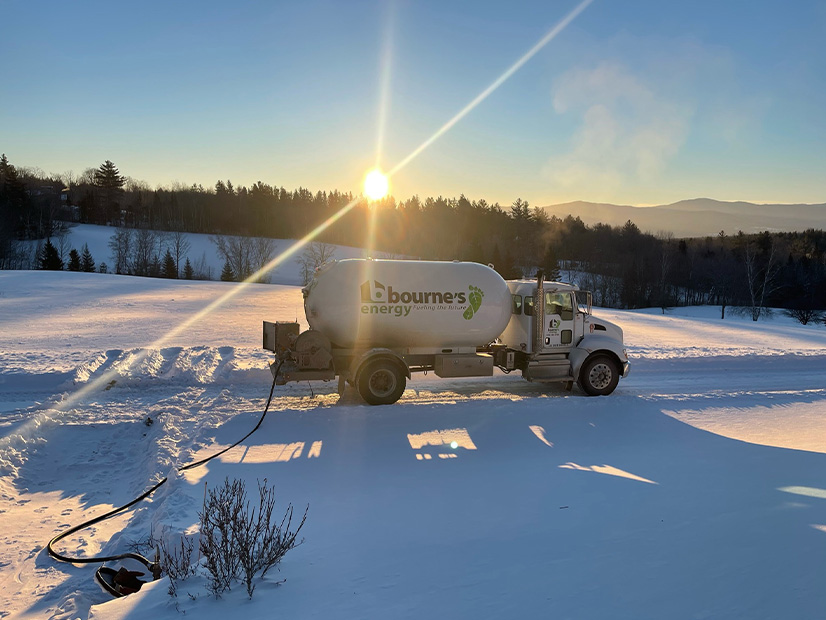
The Vermont House of Representatives’ Energy and Technology Committee has drafted a bill intended to align with the state Climate Action Plan’s call for the adoption of a Clean Heat Standard (CHS).
Committee members will continue to fine-tune the draft before introducing it in the House, Rep. Timothy Briglin said during a Feb. 1 meeting.
As drafted, the bill directs the Public Utility Commission to design and implement a CHS to reduce greenhouse gas emissions in Vermont’s thermal sector, which is responsible for one-third of overall state emissions.
The Vermont Climate Council’s initial climate plan, adopted in December, identified a CHS as a top pathway for decarbonizing building heating. About 70% of the state’s thermal sector relies on natural gas, fuel oil and propane. (See Vt. Climate Council Adopts ‘Initial Climate Action Plan’.)
Entities covered under the CHS would reduce thermal sector emissions by producing or buying clean heat credits to ensure the sector meets the carbon reduction requirements of the 2020 Global Warming Solutions Act. Covered entities would include natural gas utilities and fossil-based heating fuel wholesalers.
To obtain credits, providers could offer services for fuels or technology that reduce GHG emissions, such as advanced wood heating, cold-climate heat pumps, biofuels, renewable natural gas or weatherization. They also could purchase credits or hire a third party to provide clean heat services.
The draft bill excludes switching from fuel oil to natural gas as a qualified clean heat measure.
By September 2023, regulators would need to establish the number of credits — based on volume of sales — needed by providers annually for 10 years, starting in 2024. Updated 10-year plans will be due every three years.
A regulatory proceeding to implement the CHS would begin in August, and the PUC would have a year to finalize and adopt the standard framework.
Providers Respond
If Vermont adopts a CHS, it would put some of the state’s smaller fuel providers out of business, Paul Beauregard, owner of OnSite Propane, told committee members in Feb. 2 testimony on the draft bill.
OnSite, he said, would be “out of business Day 1.”
About 25% of the fuel providers in the market would be in that same position because they do not have a staff to install or service clean technologies, such as heat pumps, according to Beauregard.
“It will literally have tens of thousands of Vermonters scrambling immediately to find a provider to meet their needs,” he said.
Other companies that already have diversified from fuel delivery to meet the interests of customers who want cleaner heating solutions could fare better under a CHS, according to Rob Stenger, owner of Simple Energy.
Stenger has transitioned Simple to fit into what he says is a “wildly competitive market.” In addition to fuel delivery, the company provides HVAC services, blends fossil fuel with biodiesel, and installs solar systems and geothermal and cold-weather heat pumps.
But Stenger said in testimony that counting on companies to pivot like Simple is not a straightforward solution for Vermont.
While cold-weather heat pumps have become popular, they are not a reliable source in the extreme low temperatures of Northeast winters, according to Stenger. Furthermore, the skills needed to install and maintain the systems are not transferable from fossil technologies.
“There’s a ton of technical information and training that goes into selling and installing heat pumps properly and setting the right expectation for consumers,” he said.
New trade professionals are “unskilled and wildly expensive to employ,” he said, adding that it can be years before his company can recoup the investment on that labor. Revenues from fossil fuel delivery allow Stenger to invest in the extensive staff training needed to be a heat pump service provider.
The Energy Co-op of Vermont has adjusted to the energy market in much the same way as Simple, according to General Manager Brian Gray.
The cooperative delivers heating oil, kerosene and wood pellets; installs heat pumps; and performs energy audits and home weatherization retrofits. In the past year, its heat pump, weatherization and wood pellet sales accounted for 40% of revenues and “continue to grow,” Gray said in testimony.
Gray serves as a member of the Vermont Climate Council representing the fuel sector. His role on the council, he said, is to ensure fuel dealers have an opportunity to continue to thrive, and he believes a CHS aligns with that goal while meeting emission-reduction requirements. A CHS, however, will increase the cost of fossil fuels and leave Vermonters that cannot afford to switch to clean technologies with the burden of those higher costs, according to Gray.
Enhancing rebates and financing opportunities for fuel switching, he said, are key to making a CHS work.
The draft bill would direct regulators to “enhance social equity” by ensuring all customers can benefit from clean heat measures. At implementation, one-third of the clean heat credits needed to satisfy the standard would have to come from services to low-income households.
Committee members will hear more testimony on the draft this week.


